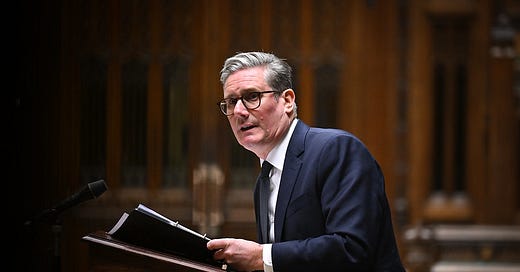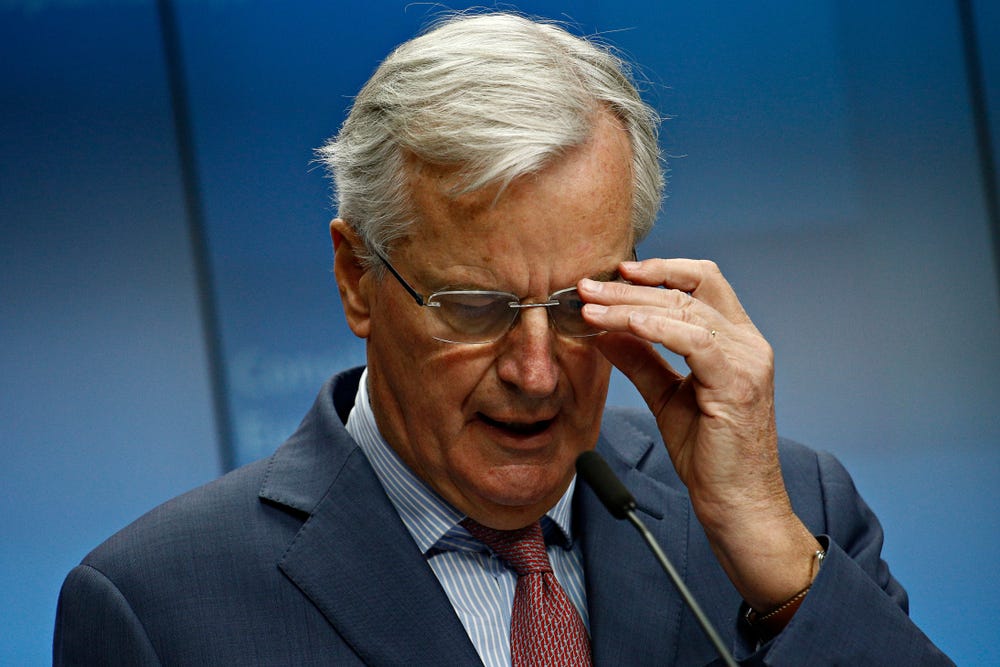
Assisted dying vote is another headache for Starmer
Today’s historic vote cuts across party loyalties and could provide a new avenue for judicial activism
Members of Parliament have voted in support of a landmark bill that would legalise assisted dying. This afternoon, the Terminally Ill Adults (End of Life) Bill, which was presented by backbench Labour MP Kim Leadbeater, passed its second reading in the House of Commons by a margin of 330 to 275. That is a majority of 55 MPs – convincing although still close.
The vote opens the way for an historic change to social legislation in the United Kingdom. In its gravity and consequences, it has been compared to the legalisation of same-sex marriage in 2013 or the abolition of capital punishment in the 1960s. If Leadbeater’s bill clears the remaining hurdles and makes its way into law, it will represent a sea change in the UK’s approach to illness, end-of-life care and dying.
The bill will now make its way to the committee stage, where it will be scrutinised by a select group of MPs. Leadbeater, as the bill’s sponsor, will appoint the members of the committee. This committee will then propose amendments and changes to the bill before it returns to the House for its third reading. At this stage, MPs get to vote again on whether they wish to accept or reject the bill as a whole, including any amendments made by the committee. If it passes this vote, the bill will then be sent to the House of Lords.
Speaking to the BBC after the debate, Leadbeater promised that the committee process will be “very thorough” and will aim to make the bill “the best it can possibly be”.
Still, critics fear that she will appoint a committee that is overwhelmingly supportive of the new bill becoming law. They argue that this will prevent adequate parliamentary scrutiny of the detail and ultimately produce a law that lacks adequate legal safeguards for vulnerable members of society and the terminally ill.
Despite such concerns, the general tone of the debate in the Commons today remained respectful. This was perhaps a consequence of a rather delicate situation in which MPs from almost every party spoke for and against the bill. Today’s free vote confirmed that views on assisted dying transcend and cut across political party loyalties. The only parties that were unified in their verdicts were the Green Party and the DUP – the Greens voted unanimously in favour, the DUP unanimously against.
Where does all this leave Westminster’s political parties? The vote will likely cause a headache for party leaders, who will have to navigate their way through the issue without upsetting substantial numbers of their own MPs.
Labour is more evenly divided on assisted dying than any other party: roughly 40 per cent of Labour MPs who voted today sided against Leadbeater’s proposals, compared to 80 per cent of Tory MPs and 15 per cent of Liberal Democrats. And with Labour opponents of the bill saying that they will keep fighting it in the committee stage and at its third reading, this issue will not go away.
The fact that high-profile MPs and ministers in the party have voiced such divergent views on assisted dying will be keeping the Prime Minister on the edge of his seat in cabinet meetings. Of Starmer’s cabinet ministers, fourteen voted for the Leadbeater Bill and eight against it, with one abstention. A concern moving forward will be that the two ministers whose portfolios will be most directly affected by any change to the law have voted against the bill. Both Wes Streeting, the health secretary, and Shabana Mahmood, the justice secretary, have voiced their grave concerns about legalising assisted dying.
Streeting, a cancer survivor who voted in favour of assisted dying when it was last put before the House of Commons in 2015, has changed his mind on the subject. In July, he posed the question: “Is palliative care in this country good enough so that that choice would be a real choice, or would people end their lives sooner than they wish because palliative care, end-of-life care, isn’t as good as it could be?”
It will take careful management from Starmer to make sure that differences on the subject of assisted dying do not boil over and poison relations between key ministers. Given that his party was so acrimoniously divided over the government’s decision to press ahead with cutting winter fuel payments for pensioners in September, he will be seeking to minimise further controversies.
Yet even if Leadbeater’s bill is eventually passed into law, the political controversy is unlikely to end there. There is good reason to believe that parts of the bill will be subjected to legal challenges in domestic and international courts, and that its scope will be expanded in the process. As the shadow justice secretary Robert Jenrick cautioned in his contribution to the debate today, at some point activist judges in the European Court of Human Rights in Strasbourg will be called upon to determine how the law should be applied.
We haven’t heard the last word in the debate on assisted dying.
Jack Dickens
Reaction Reporter
ON REACTION TODAY
Anthony Peters
French debt risks triggering a Eurozone financial meltdown
Maggie Pagano
Arbitrary EV targets are crippling the car industry
Oliver Rhodes
The UK should relish the coming trade war
ALSO KNOW
Bank of England warns of uncertain global economic outlook - The Bank of England has warned of the risks posed by rising global trade barriers to UK financial stability, saying that factors such as political tensions and increasing protectionism have interrupted cross-border capital flows.
Louise Haigh resigns - The transport secretary, Louise Haigh, resigned earlier today after admitting to an offence from over a decade ago. She pleaded guilty to fraud by false representation in 2014, after an investigation into a missing work phone. This is the first cabinet resignation since Labour have been in government. Haigh in a statement said it would “inevitably be a distraction” for the government. It is alleged that she did not disclose the full story of her fraud conviction to the Prime Minister before she was appointed to a cabinet position.
Putin praises Trump in press conference - Vladimir Putin has claimed that Donald Trump is not safe after the assassination attempt that took place in July and praised him as an intelligent politician. He also criticised the “uncivilised methods” used against the US’s president-elect and his family. This came after his recent criticism of the Biden administration’s decision to allow Ukraine to use Western long-range missiles against certain targets inside Russian territory.
Georgia protests - Police forces have clashed with protesters in a wave of demonstrations in Tbilisi. The protestors are opposed to the Georgian government’s decision not to hold new talks to join the EU until 2028. The ruling Georgian Dream Party blocked such talks to the disapproval of the country’s President, Salome Zourabichvili, who accused it of declaring “war against its own people, past and future.”
Australia passes landmark social media law - Senators in Australia have passed a law banning social media for children under the age of 16. Platforms may be liable for fines of up to 50 million dollars if they fail to adhere to the new law and will have one year to implement the ban based on the guidelines.
FIVE THINGS
Curated by the Reaction Team - William Martin
How Biden can salvage Middle East peace — and his legacy. Jonah Blank in Foreign Affairs.
Merkel’s memoir reveals her blind spots on Russia. Sylvie Kauffmann in The Financial Times.
Starmer finds world stage a law unto itself. Patrick Maguire in The Times.








